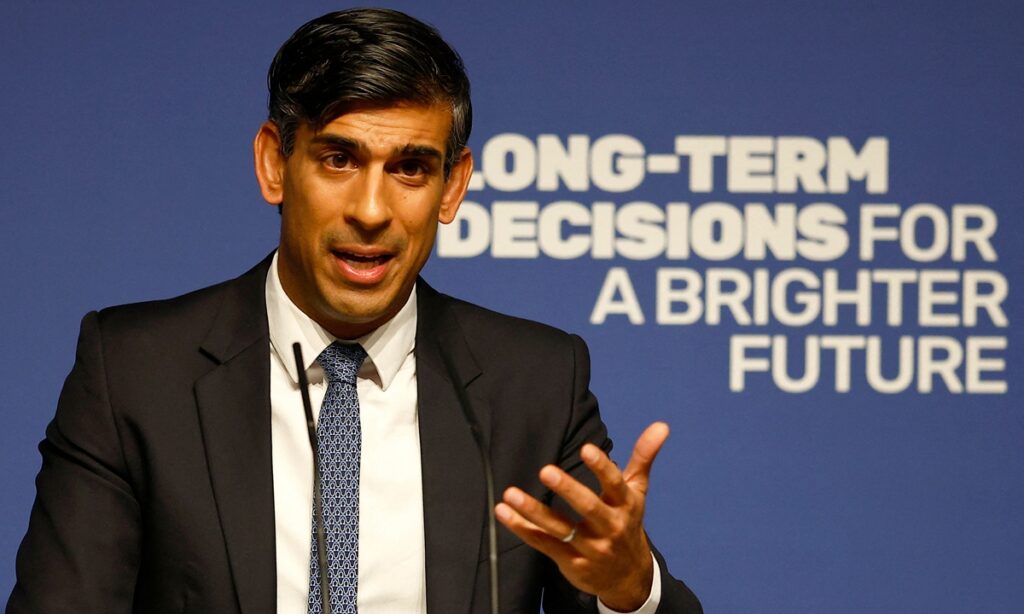Summit hard to live up to Sunak’s expectation as major power competition in AI may shadow results
The UK’s invitation for China to attend a global summit on artificial intelligence this week demonstrates the indispensable role of China on global cooperation on AI, said Chinese observers. However, they doubt whether the summit will yield substantial result as its agenda is tinted with exclusiveness and overshadowed by major powers that are vying to govern AI.
The AI Safety Summit 2023 will take place on Wednesday and Thursday at Bletchley Park, Buckinghamshire. It will bring together representatives of AI companies, political leaders and experts to discuss what some see as the risks posed by AI, with the aim of building an international consensus on its safe development.
British Deputy Prime Minister Oliver Dowden said on Thursday that China has accepted Britain’s invitation to attend the summit. “It is the case they’ve accepted, but we will wait to see everyone who actually turns up at the summit,” Dowden told the BBC. “As things stands, yes, we do expect them to come.”
China has not released information about who might participate as of press time.
The decision to invite China to the AI safety summit previously raised eyebrows in some quarters. However, British Prime Minister Rishi Sunak defended the invitation, and said on Thursday that “I do believe that it’s absolutely the right thing to have invited them.”
The summit would suffer a huge blow, perhaps even all significance, if China decides not to show up, said Shen Yi, deputy director of Fudan University Cyberspace Research Center. He pointed out that Sunak views the summit as major showcase to elevate the UK’s international status and he hopes to win points for the UK to lead the global governance of AI.
China now has at least 130 large language models launched by companies including Alibaba and Tencent, accounting for 40 percent of the global total and just behind the US’ 50 percent share, Reuters quoted brokerage CLSA as saying on Monday.
The Guardian reported in September that Sunak is considering banning Chinese officials from half of the AI summit, citing unfounded reason as “spying” by Beijing on Western governments.
This decision, if true, once again reflects Western countries’ tendency to provoke confrontation, Qin An, deputy director of the expert committee of counter-terrorism and cyber security governance at the China Society of Police Law, told the Global Times. AI governance requires the participation of the international community. However, those so-called “like-minded” countries are still following the approach of the US to exclude China and form a “small circle” of core allies, Qin said.
Doomed expectations
Sunak hopes the summit will produce a consensus on the risks posed by unrestricted AI development and the best way to mitigate them. For instance, officials are attempting to thrash out a communiqué on the nature of AI risks, with an initial draft reportedly referring to AI’s potential for causing “catastrophic harm,” according to the Guardian.
Chinese experts cast doubt on whether the summit will live up to Sunak’s expectations. The UK wants to claim the crown of AI, yet such dominance needs strength in this industry, including the development of AI and its applications, as well as its ability to contribute resources, Shen said, noting that the UK lags far behind countries like China and the US in the field of AI.
Moreover, Qin believes that the global scramble to govern AI will likely overshadow any consensus reached at the UK summit. It might be difficult for other countries, such as the US, to accept the UK playing a leadership role in the field of AI, Qin said.
US Vice President Kamala Harris, European Commission President Ursula von der Leyen and Italian Prime Minister Giorgia Meloni have confirmed their attendance at the summit. But the absence of other world leaders, including US President Joe Biden and French President Emmanuel Macron, is regarded by UK media as a “snub” to the event.
Biden on Monday signed an executive order on AI as the US moves to catch up with other governments in regulating the technology. It marked his first effort to regulate how US companies develop it and how regulators oversee the technology. The order will create standards for American companies and public agencies.
The New York Times said its release is intended to establish the US as the global leader in regulating the fast-growing tech, coming just days before the British summit.
Qin called the timing of the US’ move as Washington getting a head start as it “tries to showcase its own leadership on AI governance before the UK summit makes a fanfare. Thus you can see that even those so-called allies are also engaged in white-hot competition in the area of AI and tried to call shots of this field,” Qin said.
Based on previous experience, when a summit ends with some kind of declaration, most Western countries will as usual pay scant attention to it, such as how many actual results are yielded, Shen said.
Shen believes that instead, China is set to play a bigger role in global AI governance. The country launched a global AI governance initiative in October, and is able to hold a more influential global summit in the field to push forward positive development of the technology, said Shen.
A spokesperson from China’s Foreign Ministry said on October 18 that the initiative systematically outlines China’s proposals on AI governance from three aspects, namely, the development, security and governance of AI.
(Global Times)




